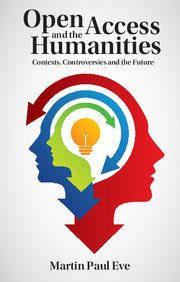Acknowledgements
There are many individuals and groups who have positively contributed not only to this book, but to my discovery of and immersion in open access. Although it may be clichéd and/or trite, I would like to thank all those who have participated in the discussions around and practical implementations of open access.
There are also, however, some figures from whom I have received individual assistance and I would like to acknowledge them more specifically here, with apologies to those I have no doubt omitted. Firstly, I thank Caroline Edwards for being my co-conspirator on the OLH project and with whom I planned this volume. She is not only a rigorous, sharp and quick thinker but a kind friend and an excellent colleague. I also, of course, thank Peter Suber for his generous preface to this book but also for his untiring efforts to make open access a reality.
I would furthermore like to acknowledge the help of Ellen Collins for the contribution that her literature review into OA monographs made to this book and for her comments on my write-up of the OAPEN-UK project. Likewise with respect to OAPEN-NL and OAPEN-UK, I owe a debt to Eelco Ferwerda, Caren Milloy and Graham Stone. With regard to the sections on the commodity form of open-access articles, I thank Joss Winn, an astute thinker in the Marxist tradition. For invitations to other various panels, projects and discussions that have informed this book, I would like to thank Geoff Crossick, Ben Johnson, Chris Wickham, Nigel Vincent, Ben Showers, Kitty Ingliss, Jane Harvell, Ann Rossiter, Neil Jacobs and Michael Bhaskar.
Elsewhere, in no particular order, I would like to thank the following for conversations, ideas and projects: John Willinsky, Alex Garnett, Juan Pablo Alperin, Don Waters, Kathleen Fitzpatrick, Cameron Neylon, Adam Hyde, Mike Taylor, Jane Winters, Tim Hitchcock, Liz Sage, Joe Brooker, Martin McQuillan, Roger Luckhurst, Hilary Fraser, James Baker and Ernesto Priego. For reading early drafts of this book, I thank Ruth Charnock and James Emmott. I thank all my friends and colleagues at Lincoln who have put up with me banging on about open access, but especially Siân Adiseshiah, Christopher Marlow, Rebecca Styler, Amy Culley, Owen Clayton, Hannah Field and Agnes Woolley.
I am immensely grateful to Cambridge University Press for their support of this volume and particularly to Richard Fisher, Linda Bree, Anna Bond, Jessica Murphy and Frances Brown. It is, of course, difficult to write about or criticise scholarly publishing within the confines and power structures of that very system. I am a believer, however, that the amplificatory power of good presses is real and that through this route this book will reach readers who would otherwise remain in the dark. While, therefore, it was a condition of this book that it be written as close to neutrality as possible, it was nonetheless brave of Cambridge University Press to let me go ahead with the project. The Press have also extremely kindly agreed to make this book open access at launch (including a form of open licensing) while selling electronic and physical copies. I was offered a royalty, but have instead chosen to donate any authorial proceeds to Arthritis Research UK, without whose work I could neither live nor work. Please do support the project by buying a copy if you are reading this online. If you are reading in print, thank you but please don't forget that there is also a searchable electronic version available to you freely.
Some portions of the writing here have appeared before in other forms, either on my personal website or elsewhere. Most notably, the meditations on peer review in Chapter 5 appeared in a significantly altered form, yet clearly enough for the genesis to be seen, as ‘Before the Law: Open Access, Quality Control and the Future of Peer Review’, in Debating Open Access, edited by Nigel Vincent and Chris Wickham (London: British Academy), pp. 68–81. Some of the remarks on collective/collaborative funding initiatives appeared within my ‘All That Glisters: Investigating Collective Funding Mechanisms for Gold Open Access in Humanities Disciplines’, Journal of Librarianship and Scholarly Communication, 2, 3 (2014).
Finally, I would like to thank my wife, Helen Eve, for her spark, patience and love and without whom I almost certainly would not have become an academic. This book is dedicated to her.
